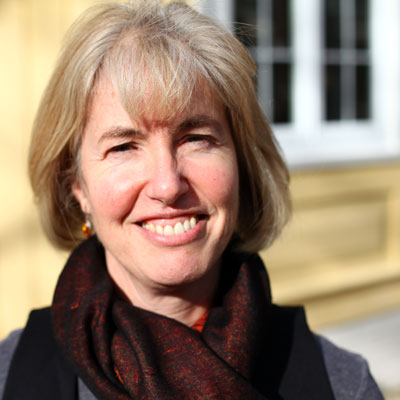 |
| Novelist and poet Anne Simpson will set up shop at Dalhousie's next writer-in-residence in January. (Bruce Bottomley Photo) |
There’s no shortage of acclaim for Anne Simpson’s writing. Her poetry collection Loop won the prestigious Griffin Poetry Prize in 2004 and was a Governor General’s Award finalist. Her novel Falling (“poetic and illuminating” according to a review in Quill & Quire) won the 2009 Dartmouth Book Award and was long-listed for the Dublin IMPAC Literary Award.
But long before the invitations for awards banquets started to arrive, she was a young mother with two children under the age of two living in a small town and stealing moments here and there to write.
“It was really hard to write but it was really good to write,” says Ms. Simpson, who still lives in Antigonish although her daughters are university-aged and have moved from home for their studies. “I know what it’s like to feel isolated.”
Which is why she feels so strongly about nurturing young writers. A poet, novelist and essayist, she is Dalhousie’s next writer-in-residence. She takes up the post with the Department of English and the Creative Writing Program in January.
Her job will involve meeting aspiring writers one-on-one to provide feedback and advice on their work, whether poetry, fiction or creative nonfiction. She’ll hold workshops on Monday evenings—alternating between poetry one week and fiction the next—as well as giving readings and hosting them.
“I have a strong sense of service to the community,” she says. “People helped me—and they continue to—so I’m conscious of wanting to give back.”
She’s no stranger to the writer-in-residence gig; having worked at the University of New Brunswick, Saskatoon Public Library and the University of Prince Edward Island. She was also the coordinator of the Writing Centre at St. Francis Xavier University for several years.
“It’s surprising what you can do in such a short time as someone who sees things from a different point of view.”
As writer-in-residence, she’ll also devote some time to her own writing. She currently working on a novel inspired in part by her own experience in Nigeria as a CUSO volunteer. She lives her own advice—to “just do it.”
“The best thing, if you want to be a writer, is to spend a little bit of time each day sitting in a chair and writing,” she says. “Just do it, it doesn’t matter for how long, just do it.”
A large Yoruba woman climbed into the van, her turban brushing the door frame. She patted it to make sure it was in place, and plumped herself down beside Clare, wiping the perspiration from her forehead with a delicate motion of her hand. “Good morning,” said the woman, formally, opening her large purse and locating several bobby pins to keep her turban firmly in place. “I am Adanya.” “Clare. Pleased to meet you.” “The pleasure is mine, said Adanya. “You are from where?” From Canada. Nova Scotia. Adanya leaned forward, abruptly, to call through the open window, beckoning to a boy selling soft drinks. Her bosom pressed against Clare as she haggled over the price. She dropped some naira into a slim, child’s hand; it vanished and re-appeared with a can of Orange Crush. She took it, flipping the tab, and foam spurted on to Clare’s hand. “Ai, ai, ai,” cried Adanya. Sorry-O.” “Don’t worry about it.” Clare licked her wrist. “Novascotia,” Adanya ran the words together, so they sounded fluid and smooth. “Nova Scotia, home of the Bluenose. I’m a Bluenoser.” “Ah ha,” Adanya bent forward, laughing. “What did you say, now?” “That’s what we say—that we’re Bluenosers.” Adanya held her hand over her mouth. Tears came to her eyes. Clare couldn’t explain; she was laughing too much. “Your nose—” Adanya gasped, one hand on her bosom as if to stop it from heaving. “It is not blue.” — from Speechless, a novel in progress by Anne Simpson |
